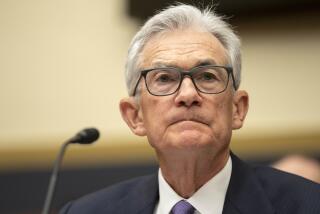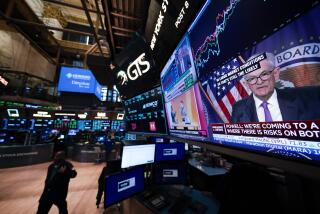Shutdown likely to delay stimulus tapering, Fed official says
WASHINGTON — A top Federal Reserve policymaker said the central bank was unlikely to start reducing a key stimulus program for “a few months” because the partial government shutdown has muddied the economic picture.
Charles Evans, president of the Federal Reserve Bank of Chicago, said Monday that he would need to see strong jobs reports and signs that the nation’s economic output, or gross domestic product, was on the upswing before he would support tapering the monthly $85-billion bond-buying program.
And if the economy got weaker, the Fed might need to increase its asset purchases rather than reduce them, he said.
Evans is one of 11 voting members of the policymaking Federal Open Market Committee, which holds its next meeting Oct. 29 to 30.
“October is a tough one,” Evans told CNBC-TV of a possible decision to start tapering next week.
“December? I think we need a couple of good labor reports and evidence of increasing growth, GDP growth,” he said. “It’s probably going to take a few months to sort that out.”
Economists said the 16-day shutdown probably cut about 0.6 percentage point from economic growth in the year’s fourth quarter. It also stopped the production of nearly all government economic reports, a significant blow to the ability of Fed officials to gauge the strength of the recovery.
The data will start flowing again this week, highlighted by Tuesday’s release of the September jobs report. The report had been scheduled for release Oct. 4.
Analysts project that the report will show the economy added 185,000 net new jobs in September, up from 169,000 the previous month. The unemployment rate is forecast to hold at 7.3%.
Evans said he wanted to see the economy consistently adding about 200,000 jobs a month, which it had been doing this year before labor market growth slowed in the summer.
But Evans warned that political fighting over fiscal policy in Washington was a drag on economic growth. And he said another budget and debt-limit fight looming early next year would be a factor in the Fed’s decision-making when it meets in December.
“It’s very difficult to feel confident in December given we’re going to repeat part of what just took place in Washington,” he said. “There was a lot of fiscal drama, which I think caught everybody’s attention.”







